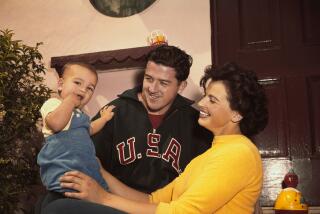THE NHL : This Is the Year of the Czechs
- Share via
In 1981, Jan Ludvig crawled on his belly under the Iron Curtain and across the international frontier to freedom.
A year earlier, while authorities slept, Peter Stastny and his younger brother, Anton, used the guise of a national team tour to bolt communism with the same speed they would later use to bolt through the Hartford Whalers defense.
In 1974, Vaclav Nedomansky started it all by defecting from Czechoslovakia to play in the World Hockey Association and, three years later, with the Detroit Red Wings.
In the next 12 years, defections continued. From Petr Klima to Petr Svoboda to Michal Pivonka to Bobby Holik’s brother-in-law, Frantisek Musil, they came without enough vowels in their names and, usually, with loads of talent.
It was the difficult cultural and on-ice adjustments that buried some of them.
Back home, in a Slavic-merged country of 10 million Czechs and five million Slovaks, the communist regime singularly devised a mental hell for the friends and family of those who fled.
But when the Wall crumbled in Berlin last year and a democratic government was forged in Prague with a flashy, dissident writer, Valcav Havel, drafted as president, the door to the NHL swung open for Czechs of all ages.
In fact, the great forward line of future national teams -- mercurial Robert Reichel, strapping Bobby Holik and multidimensional Jaromir Jagr -- plays in Calgary, Hartford and Pittsburgh, this season.
NHL franchises draft teen-age Czechs in the first round these days and get them immediately -- something unthinkable even three years ago. No more 10th-round picks accompanied by prayers and spy-novel intrigue in hopes of a mysterious, miraculous defection. Czechs are pouring in: Last season, there were 13 in the NHL, the same as in 1982. No fewer than 21 new ones, in 17 cities, are trying out at NHL camps. Along with Holik, a Czech from Jihlava, comes balding Slovak offensive-defenseman Jergus Baca to Hartford.
Not since a lend-lease program in the early 1980s brought the likes of Jiri Bubla to Vancouver and Miroslav Dvorak to Philadelphia have Czechs been cleared to play. But with NHL president John Ziegler still trying to negotiate an appropriate compensation agreement with the Czech federation, teams -- as in the case with Baca -- are left to negotiate a player’s release form when there is a dispute over an existing contract.
Although the Whalers threw three Get-To-Know-Bobby news conferences, they obviously have good reason to shy away from attaching any “savior” tags to Holik. No Czech has ever been selected as a first- or second-team All-Star. None have scored 50 goals in a season. Only Stastny, the all-time leading scorer against the Whalers, has scored 100 points in a season -- he has done it seven times.
Yet the Whalers also have reason for grand optimism. Stastny and Jaroslav Holik, Bobby’s father, are Bobby’s two big heroes. And Stastny, Jaro and Bobby are of the same ilk: big, strong, character centers.
The bloodlines, the desire and a lifelong commitment from his father are in place to buttress Bobby’s career. His body and demeanor should be suited well to the NHL’s grinding style.
As Stastny, 34, one of only 26 players to score 1,000 NHL points, lays on the massage table in the New Jersey dressing room, he smiles broadly when images of Czechoslovakian kids infiltrating the NHL flash through his mind.
“Oh, so young,” Stastny said. “They don’t know what we went through. Later on, they will. Their knowledge of what happened will come. And they will appreciate. But that is all OK. I have enjoyed personal freedoms for 10 years. I am very happy the young guys don’t have to go through it.”
“I was told by some there that I helped break the system by showing my disapproval. But there were guys who went ahead of me that I have so much respect for. I’m not the godfather, just part of the process.”
It, as Stastny describes the situation, was a devious, systematic revenge by Communist authorities. When a player defected, this left others vulnerable to the whims of an unforgiving regime. Maybe a brother would suddenly lose a job. Maybe a father would be demoted. Maybe a sister would lose admission to the university.
“Their strategy was that if you did leave they’d get to your family or friends,” Stastny said. “This is definitely the worst thing you must go through. Everywhere in that society there was the factor of fear. You were always worried about something. That’s the way the system was fed. They tortured minds, which can hurt as much as torturing bodies.
“Actually, it never ends, even after communism fell. Always my decision and the results will remain on my shoulders. We tried to think about our future and have compensated those people we hurt as much as possible.”
Stastny, the proud Slovak from Bratislava, returned to his hometown on the Danube for the first time since 1980 during the off-season.
“It was very, very memorable,” Stastny said. “We left, freshly married, as two. We came back as six. We’ve seen our parents in different countries, like Hungary. But it was so nice to see them at home, to show our own children. And also to see cousins and in-laws we hadn’t seen.”
Even as Stastny was enjoying his homecoming, Holik was preparing for his departure. He had been to the United States before and had traveled throughout Europe with national teams, but this was different. He was striking out on his own.
On July 15, Holik, who had only recently ended his army duty a year early with the help of tennis player Ivan Lendl, arose from bed at his parents’ home. He ate breakfast. And then, mother, father and Bobby piled into the car for a two-hour ride to the Prague airport. His parents waited until Bobby climbed aboard a Lufthansa jet to Frankfurt with a changeover flight bound for Boston. There, a white limo -- compliments of Whalers advisory board member Bobby Orr -- was waiting to whisk him to owner Richard Gordon’s summer home in Newport, R.I.
If this -- except for the limo part -- sounds more like a kid going to college than Stastny’s story of mental torture, you are beginning to see why those folks were dancing, prancing and partying atop the Berlin Wall last year. Freedom was doing one of those Denis Savard spin-o-ramas.
“I have thought about it, and how those who defected had been in great danger,” Holik said. “At the airport it was emotional for my mom, but very much for my dad, too. He did everything so I could play here. I want to play good for him. That will give me satisfaction. He said he gave most of his life’s power to my sister Andrea and to me.”
The Communists evidently weren’t too big on honoring sports stars gone awry. Stan Mikita was born in Sokolce, Slovakia, in 1940. Although he grew up in Canada, his 1,467 NHL points are the most by a European-born player and fifth all-time.
“Forget about visiting Mikita’s hometown,” Stastny said. “They built a dam. It’s underwater.”
“Ivan Lendl’s dad was head of the Czech tennis federation,” Holik said. “When Ivan left -- he didn’t defect -- his dad was fired. Now he’s head again. They told him six years ago he’s too old. Now, he’s younger. It’s very weird.”
When Andrea, a tennis professional, defected, Jaroslav Holik was dropped from head coach to assistant for Dukla Jihlava. When communism ended, Jaroslav was rehired as head coach this season.
Jaro Holik had been a big, strong center. Brother Jiri was a dynamic skater on his left wing.
“My uncle was the greatest Czech skater, maybe in all Europe, at one time,” Holik said. “My dad wasn’t a great skater, but he was so strong. He claims he never lost a faceoff.”
Stastny remembers Jiri, while they were on the national team together, talking about Jaro: “He said how tough he is in raising his son. They said he already was monster size at 6. I heard they fed him raw meat.”
Even before the fall of communism, Holik’s father had him tutored in English in preparation for the NHL.
“It would be terrible now here if I couldn’t speak English,” Bobby Holik said. “I wouldn’t want to be in the same position as Jergus.”
“I admire (Holik’s) dad, a special breed. He paid a price on and off the ice,” Stastny said. “Under that system you could not revolt without paying the consequences. He had an emotional, aggressive style and played like that until he was 37. He’s the kind of player they look for in the NHL. The son should be like the father.”
Jaro Holik scored the game-winning goal in a 3-2 victory over the Soviet Union to clinch the world title in 1972. Obviously, the goal is a source of great pride in the Holik house.
“But the best is still 1969 when the Czechs beat Russians,” Bobby Holik said. It was revenge for them invading our country in ’68. There were people beating down the doors at the Aeroflot office in Prague. People went crazy.
“The TV announcer was fired by the communists because he was so happy about the victory. I only found out about that six months ago. It was a secret.”
When Stastny heard about Holik’s story, he replied, “Ah, there will be so many things he will learn.”
Because they were established international stars, there was more fanfare in the NHL surrounding the Soviets last autumn. While some, notably Sergei Makarov, played well, the Soviets generally were a disappointment.
Not only are the Czechs entering a foreign environment this year, but many also are kids.
Baca and Chicago’s Dominik Hasek -- considered the best goalie in Europe -- are 25. Vancouver’s Richard Kron is 23 and Chicago defenseman Frantisek Kucera is 22. But Jagr and Vancouver center Petr Nedved (who defected as a junior player) are 18. Holik, Vancouver’s Jiri Slegr (Bubla’s son, who changed his name because Bubla is in jail for drug smuggling) and Reichel are 19. Zdeno Ciger, Stastny’s teammate, is 20.
Holik, already a hulking, 6 foot 4, 210 pounds, finished first on the team in a training-camp test to determine aerobic endurance.
“The magic word here is ‘young,”’ Whalers general manager Ed Johnston said. “You’re talking 19, not 28. Holik’s biggest assets right now is he’s a North American-style player. That’s bred in with his dad. And the fact he speaks English.
“Peter Stastny was in a different situation than these kids. He defected. And he already was high-profile international player. The Stastnys had to play hard. What else could they do? They couldn’t go back.”
“Peter played like a North American -- so does Holik,” Whalers coach Rick Ley said. “Peter’s brother, Anton, played like a European. And he didn’t last as long.”
Stastny believes age will be the young Czechoslovakians biggest ally.
“The younger they are the easier they adapt,” Stastny said. “Three things here are the keys: the long schedule; the different style of play; and the level of physical and mental pressure. This is the best league in the world by far. It takes some character to endure. Being willing to pay the price is the determining factor ... I will be watching these young players.”
More to Read
Go beyond the scoreboard
Get the latest on L.A.'s teams in the daily Sports Report newsletter.
You may occasionally receive promotional content from the Los Angeles Times.






